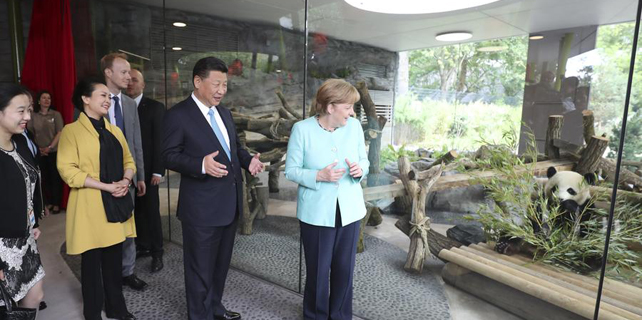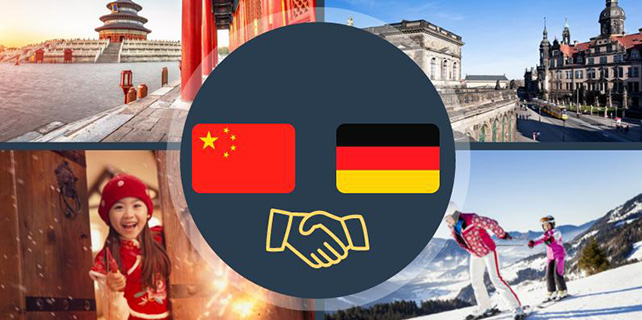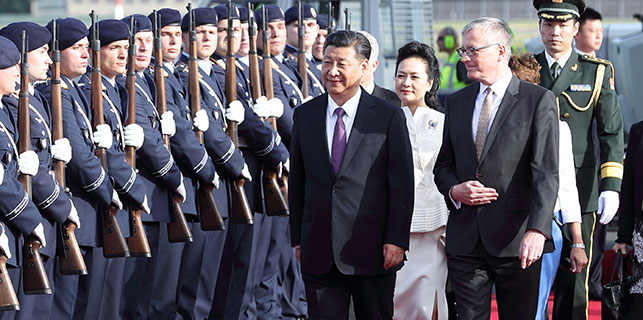China-Germany ties serve as model for Sino-European partnership
BEIJING - Chinese President Xi Jinping's ongoing state visit to Germany is focused on deepening bilateral strategic ties and advancing the Sino-European partnership featuring peace, growth, reform and civilization.
Xi's trip is his second state visit to the country as China's head of state, sending a strong message to the world that both sides are committed to enhancing political trust and facilitating free trade and economic globalization.
Chinese and German leaders discussed expanding cooperation, particularly within the G20, highlighting efforts to build greater consensus on both sides.
"As staunch supporters of open economy and economic globalization, China and Germany share more interests in jointly tackling global challenges," said Ruan Zongze, executive vice president of China Institute of International Studies.
Though anti-globalization is on the rise and European integration is suffering setbacks, China and Germany share a common stance on major global issues such as economic globalization and multilateralism, opposition to protectionism and commitment to the Paris climate agreement.
Beijing and Berlin have set up more than 70 bilateral cooperation mechanisms, helping to build mutual political trust. The countries are also enhancing cooperation as they seek to align the "Made in China 2025" plan with Germany's "Industry 4.0" concept.
Bilateral ties have been enhanced by a number of high-level visits. German Chancellor Angela Merkel has visited China 10 times during her term. During Xi's visit to Germany in 2014, he and Merkel agreed on a comprehensive strategic partnership, pointing the direction for the development of bilateral ties in a new era.
Apart from their stable political relationship, they share strong trade and economic ties, with both economies becoming highly complementary. In 2016, China for the first time became the biggest trading partner of Germany with trade volume reaching 151.29 billion U.S. dollars.
China's economic restructuring and its booming market keeps on creating opportunities for German enterprises, while Germany's advanced facilities and managerial experience can in turn assist China's industrial upgrading.
According to China's Ministry of Commerce, China invested over 2.9 billion U.S. dollars in Germany in 2016, a 258.6-percent increase year on year. In the same year, Germany invested over 2.7 billion dollars in 392 new projects in China.
As for people-to-people exchanges, over 1.6 million visits were made between the two countries in 2016, while cultural exchanges, especially themed film festivals, have become common in both countries.
In early June, two weeks after a vintage German film festival was held in Beijing, a Chinese film festival opened in Munich, screening 16 Chinese movies and exhibiting a series of traditional Chinese paintings and art works.
Moreover, in November 2016, China and Germany signed their first cooperation agreement on football, which underlined the training of coaches and youth players.
The two countries are currently exploring possibilities to cooperate with a third country, such as the cooperation of China motor giant CRRC Corporation with Germany's Siemens to produce subway trains for export to the United States and Brazil.
Ties between the two countries have weathered global upheavals with joint efforts to handle differences through equal dialogue and friendly consultation, and create mutual support on core interests and concerns.
By doing so, China and Germany, together with the whole of Europe, can march ahead on the path to multilateralism and creating a multipolar world.
"Stable and mature China-Germany ties will play a leading and exemplary role in the China-EU relationship at a time when Europe is facing a complex situation with uncertainties brewing in the world," Ruan said.









